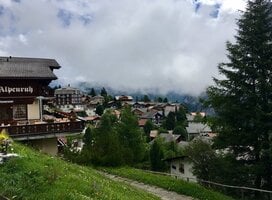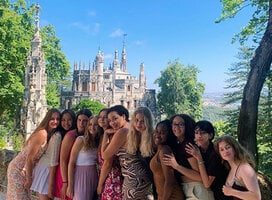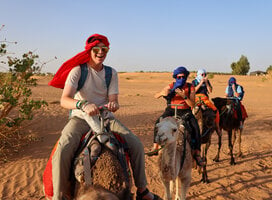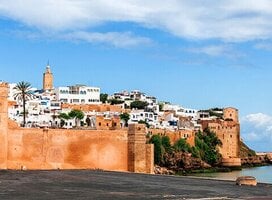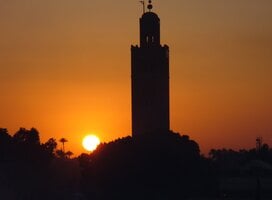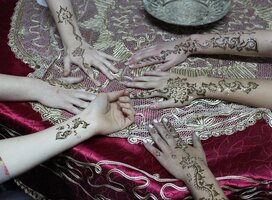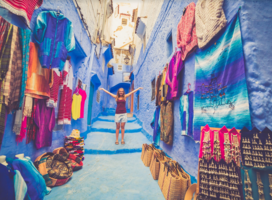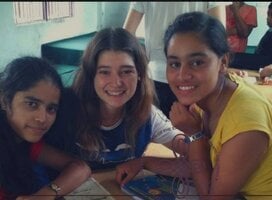High School Abroad in Morocco
Beautiful medina quarters with handmade goods from local artisans, Rif and Atlas Mountains, beaches once inhabited by The Beatles, and camel rides through the Sahara Desert are just a few reasons to do a high school abroad program in Morocco.
Volunteer for a week in Fez to help build youth centers, participate in a photo workshop in the mountains, or live with a host family in Rabat over the summer to practice your Arabic or French skills. While there aren't any full year or semester exchange programs for high schoolers, there are plenty of volunteer and language immersion programs.
Morocco is great for students who are interested in Middle Eastern and North African Studies, want to practice Arabic or French, and want to gain experience in community development.
If you're interested in spending time abroad in Morocco while in high school, you can choose from:
- Volunteer programs
- Short term study abroad
- Teen travel tours
Volunteer programs / service-learning
Spend two to three weeks volunteering in places like Rabat, Skoura, or Marrakech while assisting with community development efforts. Some projects include building youth centers or volunteering at schools. Most programs have host family options, which is great for students who want to practice their language skills.
Short term study abroad
While there aren't any semester or year-long study abroad exchanges, students can enroll in summer programs, where they will spend their time mastering Arabic or French, get the chance to spend a week or two with a host family in Oulmes or Rabat and learn about Morocco culture through arts and food.
Teen travel tours
If you want to eat tapas in Spain, learn about Portuguese history in Lisbon, and drink mint tea with a Berber family in Morocco, then an 18-day teen travel program over the summer might be just what you are looking for. Additionally, students who want to take on the world by sea can study aboard a ship while getting the chance to visit some of the places they learn about.
Popular cities
Morocco's diverse geological terrain makes each city really different from one another. Here are some cities near specific types of scenery:
- Close to beaches: Assilah, Rabat, or Tangiers are both great options for students who like to drink mint tea with ocean views.
- Close to mountains: Chefchaouen, also known as the "Blue City" is nestled high up in the Rif mountains. Skoura, surrounded by the Atlas mountains, is a beautiful oasis town with a long line of Kasbahs.
- Busy cities: Students who love large markets, exploring medinas, and speaking with local artisans will love Marrakech or Fez.
Student visa requirements
According to the Department of State's website, students who visit Morocco for 90 days or less will not be required to obtain a visa.
Housing
Most students will stay with a host family for all, if not most of their program. This is a great way for high schoolers to practice their language skills while being fully immersed in Moroccan culture and lifestyle.
Students who have orientations in Rabat will stay in a hotel or hostel prior to departing to the city where their program is.
Costs
Most programs in Morocco last between one to four weeks, and cost between $2,795-$5,500.
The official currency in Morocco is the Dirhams (Dh), and $1 USD is equivalent to Dh $9.56. A mid-range priced dinner will cost you between Dh70-150. Morocco is a very cash based society, especially at markets, so it is recommended that students withdraw cash from an ATM.
Overall, it's a very affordable country and -- if housing and food are included in your program fees -- you can get by on a budget of $20 - $30 USD per day.
Cultural etiquette
Moroccans are very hospitable and extremely welcoming. Due to the important role of religion, many Moroccans are traditionalists, meaning that that students should take a more conservative approach to their demeanor while traveling through the country. Here are a few tips.
- Clothing: Shoulders and knees should be covered, especially in religious buildings, like Mosques.
- Gender roles: Younger Moroccans tend to be more liberal than their elders, but Morocco is still an extremely patriarchal society.
- Relationships: PDA is not widely accepted in Morocco, as religion plays a crucial role in social norms which is why you won't see Moroccan couples kissing or holding hands publicly. Friends of the same-sex, however, will hold hands as a sign of friendship. Don't be surprised if your new Moroccan friends do the same with you!
- Sexual harassment: Verbal harassment like catcalling is very common in Morocco. The best thing to do in these situations is to ignore the person making the remark. If a situation becomes too invasive, please report it to your program staff immediately.
- Drinking and smoking: Instead of going to bars, it is very common for Moroccans to meet and hang out at cafes, where the preferred drink of choice is mint tea. Women rarely drink or smoke in Morocco, which is something to keep in mind.
Packing tips
Morocco is extremely hot, as the cities are built on desert land. Keeping cool while being attentive to cultural conservative norms can be a bit tricky, so here are a few tips for things to pack:
- Scarves are an easy way to cover up your shoulders when it's too hot to put on a jacket
- Long skirts, or dresses that cover your knees
- T-shirts, not tank tops
- Jeans, or thin fabric pants
- Sandals and sneakers
- "Type-C" plug for charging your electronics
Vaccinations
Students traveling to Morocco should make sure that they are caught up on all of their standard vaccinations, like measles-mumps-rubella (MMR) vaccine, diphtheria-tetanus-pertussis vaccine, varicella (chickenpox) vaccine, polio vaccine, and your yearly flu shot. In addition to these, students can also get vaccinated for Hepatitis A and B, typhoid, and rabies.
Safety
Morocco is a very safe place for travelers, with the exception of petty theft and sexual harassment. Travelers should keep their money secured in a money belt or cross-body bag, and make sure to make copies of all important documents, such as passports and credit cards.
